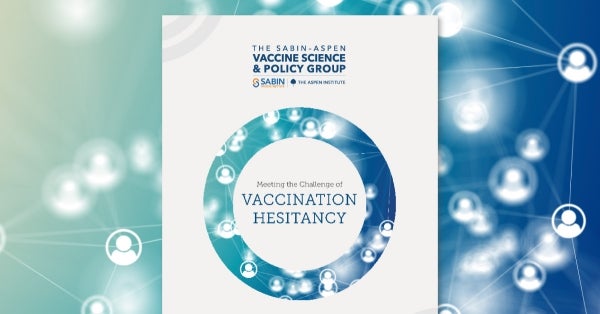Meeting the Challenge of Vaccination Hesitancy: Q&A with Damon Centola
Can the study of network dynamics offer solutions for curbing the anti-vaccine movement?

Photo Credit: Charles Deluvio / Unsplash
In 2019, the World Health Organization declared vaccine hesitancy one of the top 10 threats to global health. In recent years, worldwide measles outbreaks in communities with low immunization rates have revealed gaps in the herd immunity that once protected us, including the United States’ largest measles outbreak in 20 years in 2019. The troubling trend of declining vaccination uptake is fueled by complacency and loss of confidence in the system that develops, produces, recommends, and delivers vaccines. And, of course, nothing in recent memory has underscored the urgency of a strong vaccine system more than COVID-19.

While effective vaccines to control the current pandemic are likely at least a year away, public health officials believe the time to build confidence in those vaccines is now. A new report from the Sabin-Aspen Vaccine Science & Policy Group presents an in-depth analysis into the root causes of vaccine hesitancy and actionable steps to address it. Author of How Behavior Spreads and an expert in network science, Professor Damon Centola contributed an essay, entitled "The Complex Contagion of Doubt in the Anti-Vaccine Movement," to the report. He recently answered a few questions about the anti-vaccination movement and how to curb it.
What is a complex contagion?
Social contagions fall into two broad categories: simple and complex. A simple contagion spreads easily with social contact, like the measles or COVID-19. A complex contagion requires social reinforcement to spread, like wearing a facemask, or adopting new beliefs about the safety of recommended immunizations. Simply hearing a piece of anti-vaccine propaganda does not change a person’s beliefs. Rather, people need to be convinced — the hallmark of a complex contagion — through contact with several peers who can reinforce the legitimacy of a point of view.
How does doubt benefit the anti-vaccine stance and hinder public health campaigns?
A successful campaign of anti-vaccine sentiment does not need to convince every parent of every anti-vaccine fact or falsehood; it simply needs to generate sufficient credibility for the anti-vaccination perspective that people begin to doubt the safety of vaccines. Although there is enormous variation in human physiology (often compounded by environmental and social factors) and the causes of medical complications in an infant or very young child are too many to enumerate, the contagion of doubt focuses these vague parental anxieties into a specific threat — the perception that there may be a danger from vaccines (even if it’s unproven). Anti-vaccination propaganda soothes these anxieties by suggesting that parents can protect their children from an unnamed multitude of harms by simply not taking the putatively “dangerous action” of vaccinating their children.
Why are people more likely to opt for inaction over action when faced with doubt?
In the vaccination arena, the contagion of doubt is framed as a contest between a safe behavior (inaction) and a potentially dangerous behavior (vaccination). The goal of the doubt contagion is to trigger “fear, uncertainty, and doubt” about the possible consequences of the decision to vaccinate. The logic that follows is not strictly rational, but it is fairly clear and predictable: people retreat to the safety of inaction.
How can we harness what we know about the spread of information to promote vaccination and public health?
The spread of vaccine hesitancy comes from the increased acceptance of the possibility that vaccines can be harmful, which grows not through the sharing of specific information (or misinformation) but rather from having that information sufficiently socially reinforced that citizens believe it to be credible. But, if the contagion of doubt spreads most effectively through clustered networks of peers, it may be possible to counteract that contagion with the same strategy. As discussed in my book, How Behavior Spreads, creating networked communities, online and offline, in which social reinforcement is strategically harnessed to delegitimate anti-vaccine arguments is one promising approach. The strategies of complex contagions provide useful guidance for targeting places in the social network where reinforcement can decrease the credibility of the anti-vaccination movement.



